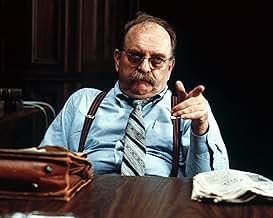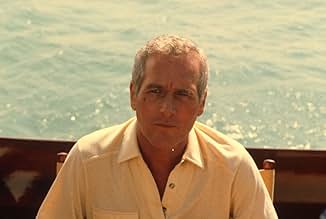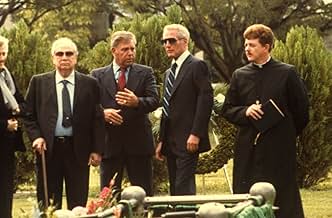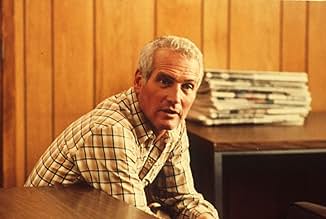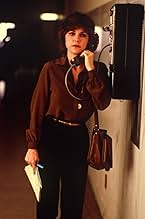Cuando un fiscal filtra una historia falsa de que el dueño de un almacén de licores está involucrado en un asesinato, la vida del hombre comienza a desmoronarse.Cuando un fiscal filtra una historia falsa de que el dueño de un almacén de licores está involucrado en un asesinato, la vida del hombre comienza a desmoronarse.Cuando un fiscal filtra una historia falsa de que el dueño de un almacén de licores está involucrado en un asesinato, la vida del hombre comienza a desmoronarse.
- Nominado para 3 premios Óscar
- 3 premios y 8 nominaciones en total
- Nickie
- (as Anna Marie Napoles)
- Walker - Standard's Photographer
- (as Rooney Kerwin)
Argumento
¿Sabías que...?
- CuriosidadesPaul Newman once said of this movie while publicizing Veredicto final (1982): "I'd rather have the freedom to do the kind of pictures like Veredicto final (1982) ... I enjoyed kicking the beejeezus out of the press in Ausencia de malicia (1981)."
- PifiasAfter spending his first night with Megan, Michael tells her as he is leaving that it is 5:30 a.m. It is clearly daylight outside. In Miami in mid-December, it would still be dark outside at that time.
- Citas
James J. Wells: I tell you something, you're a smart fellow. Don't get too smart. I'm pretty smart myself.
Michael Gallagher: Everybody in the room is smart. Everybody's just doing their job - and Teresa Perrone's dead. Who do I see about that?
James J. Wells: Ain't nobody to see. I wish there was. You're excused now, sir.
- ConexionesFeatured in Sneak Previews: Pixote, Ragtime, Buddy Buddy, Absence of Malice (1981)
An absorbing and uniformly well-acted blend of newspaper movie, political thriller, character study and romance (with the latter being the least successful i.e. most disposable and unconvincing element), the film deservedly earned Oscar nominations for Newman (his sixth – playing a longshoreman who starts being investigated about the murder of a rival simply because of his parental link to mobsters and the damage it causes to his integrity and daily existence), Melinda Dillon (as a friend of Newman’s who’s brought in to supply an alibi for him but which would expose the guilt in her own personal matters and which lead her to commit suicide!) and Kurt Luedtke’s fine, incisive script. Sally Field isn’t an actress I’m particularly fond of (for the record, I’ve watched neither of her two Oscar-winning performances in NORMA RAE [1979] and PLACES IN THE HEART [1984]: their directors, Martin Ritt and Robert Benton respectively, would coincidentally prove crucial to Newman himself!), though she’s perfectly cast here in a role encompassing resourcefulness, tenacity, awkwardness, tenderness and, finally, humility. She’s the star reporter who initially ‘leaks’ the news of the investigation on Newman thinking it as her duty, but doesn’t stop to ponder the consequences…as a result of which, her relationship with Newman proves a troubled one (in the film’s most intense sequence, he physically assaults her when she turns up before him after Dillon’s death!).
The title is a reference to a legal clause which basically states that newspapers are free to print anything they like, and that the people involved can do nothing against them because their reporting is accurate (even if it may not ultimately prove to be factual). The film’s climax – which plays like a dry-run for THE VERDICT itself and is highlighted by a scene-stealing turn from Wilford Brimley, it’s revealed how Newman has cleverly rebounded the affair on itself (so that it’s the reporters, the investigating committee and the D.A’s office who get their gooses cooked, as it were!). A nice surprise is Luther Adler’s appearance as Newman’s mobster uncle – and also worth mentioning is Dave Grusin’s fine score.
- Bunuel1976
- 3 oct 2008
- Enlace permanente
Selecciones populares
Detalles
Taquilla
- Presupuesto
- 12.000.000 US$ (estimación)
- Recaudación en Estados Unidos y Canadá
- 40.716.963 US$
- Fin de semana de estreno en EE. UU. y Canadá
- 97.667 US$
- 22 nov 1981
- Recaudación en todo el mundo
- 40.716.963 US$
Contribuir a esta página



